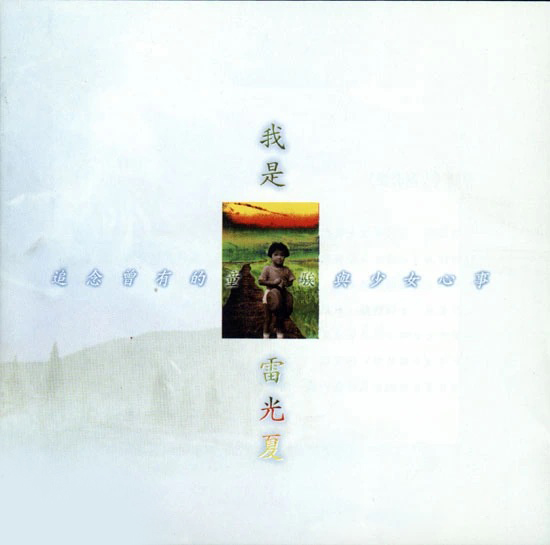Doesn’t it feel like sometimes all we need is a little push? When I hear Summer Lei’s debut, 我我是雷光夏 (I Am Lei Guangxia), I meditate on what we sometimes stand to lose simply by not taking that first step. Pastoral, experimental, and quite immediate, personal, and warm, rightfully, so much of what makes this music special could have been lost to interpretation and time…if Summer wasn’t prompted to commit to putting it on tape.
Born Lei Guangxia, in 1968, in Taiwan, Summer was fortunate to grow up in an age where Taiwanese autocratic rule would dissipate, clearing room for freer forms of expression. By the time Summer was in high school, a young affection for music would blossom into taking her first steps as a singer-songwriter (following, in some way, the prosaic pursuits of her gifted father, himself a painter and poet).

Unlike the generation of the past, Summer’s early music – one deeply rooted in personal introspection – went further, exploring frank topics about her maturation (as a woman and as a distinctly Taiwanese person). By the time Summer graduated from Taipei’s Tamkang University, what was once a love of the folk singer-songwriter tradition, had transitioned into something else, growing into a composer and a (perhaps) translating her education into a career exactly there: as a music teacher.
Luckily for us, it was as a graduate student that Summer would come under the influence of musicians like Chen Ming-Chang, Jimi Chen, and Lim Giong, “New Chinese Music” artists that were exploring music more as a soundscape. And in short turn, Summer inspired herself to think: “What if I pursued making soundtracks?” So called, “Character Music”, a Taiwanese version of “ambient music” was beginning to flower and her ideas had a certain affinity to it. Yet, where could she go to pursue that path?
One day, while having a conversation with her dad, Summer brought up her admiration of Taiwan’s Crystal Records record label. It was on Crystal Records that she could hear new music that “created poetry with sound”. Her father, who had heard her earlier folk music, simply told her, “Why don’t you send them your music?”. Tired of her fretting, he spurred her to waste no time and act. She curated a set of demos where she combined her acoustic-driven music with collected field recordings from her past. In some way, creating the sound poetry, she wanted to pursue.
Summer would be persistent, sending demos out consistently, until one day the label head called her up and signed her to Crystal Records. Her label head saw potential in her and introduced her to the music of Laurie Anderson, who she fell in love with (and he saw heard some kind of musical kinship to). And in turn, Summer began to understand just what kind of untapped potential her music could dig into. It seems that what everyone wanted to hear wasn’t Summer running away from her past…but absorbing it…fulfilling the promise of her future.
So, in the span of three days, experimented and recorded the songs you’d hear on 我是雷光夏 (I Am Lei Guangxia), coming up with new angles to take on songs she recorded when she was a teenager. Rather than rely on merely personal writing, Summer would also think like a director, creating alternate angles to re-examine her memories, integrating ambiance and ambient sound to color these experiences.
With a voice that spirits the same air as a Judy Collins, 我是雷光夏 (I Am Lei Guangxia) embraces the new color of folk music as it transitions into more surreal territories. A five-part epic, “时间(I)”, traverses through the record connecting hypnagogic soundscapes with spoken poetry, acting as ambient vignettes to just as powerful melodic songwriting – similar to Japan’s Mio Fou. Augmented by graceful orchestral instrumentation, absolutely gorgeous songs like “逝” put us back into the realm of Vashti Bunyan and Nick Drake, rewriting history to place that pastorale into the mountains and hills of a rural Taiwanese landscape.

When I think of communing with emotions that need no introduction, I think of songs like “榜外”, “入山”, and “波斯”, seemingly, direct songs that defy easy classification. Similarly, atmospheric ideas like “冬天不相干的故事” sound untethered to any era or state. By affirming her existence, by affirming her story, Summer Lei does make the impossible possible, creating a universal music that can spirit you along to a different foot step, on a path you’ve never been before, but that sounds, awfully, familiar.
